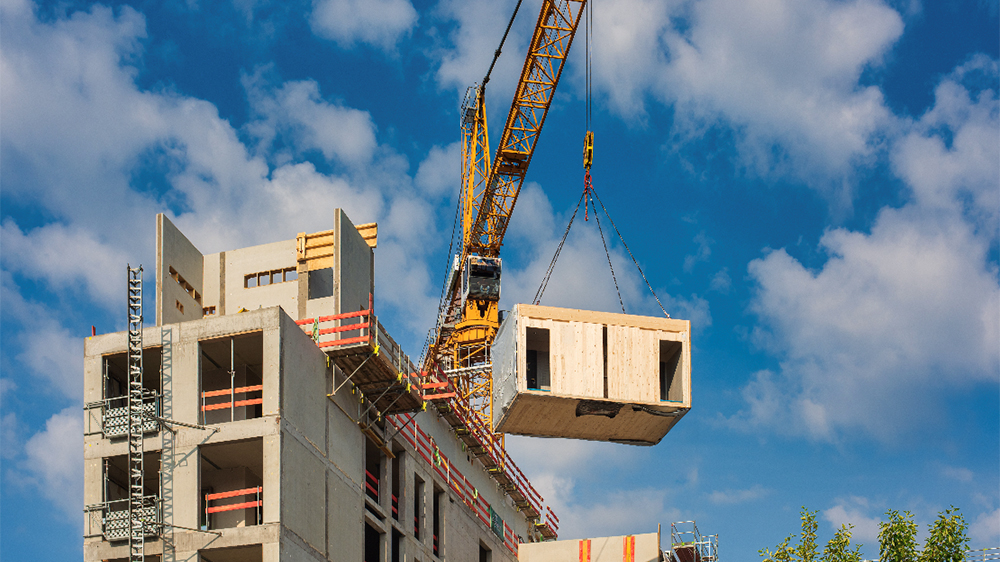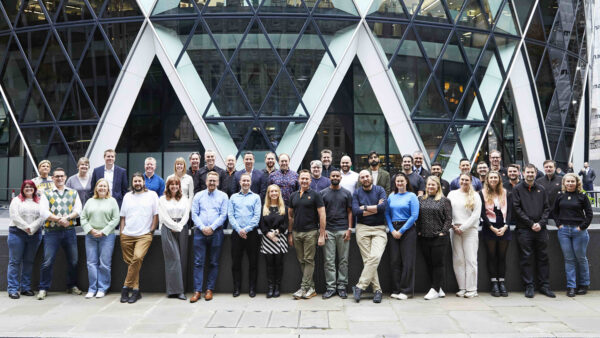
Womble Bond Dickinson (WBD) hosted a lively online panel discussion with experts on MMC (modern methods of construction) earlier this month (2 March), as part of its re:build Britain campaign, following the publication of its special report MMC: a fit for the future.

WBD invited experts from across the industry to discuss the merits of MMC and the challenges its new methodologies face breaking into the UK construction market.
Ian Atkinson (left), partner from WBD’s Construction and Engineering team, chaired the discussion and was joined by:
- Joseph Worland, associate director, Lloyds Banking Group
- Stephen Wightman, regional director – UK MMC Lead, Faithful + Gould
- Jessie Wilde, deputy project director, Bristol Housing Festival
- Edward Jezeph, senior investments manager, Homes England
- Pablo Martinez Rodriguez, senior lecturer, Department of Mechanical and Construction Engineering, Northumbria University.
Standardisation
Ian Atkinson kicked off the panel discussion asking whether standardisation was the answer to supporting the growth of MMC.

Northumbria University’s Pablo Martinez Rodriguez explained the industry is already pushing for standardisation in some areas, but it’s a double-edged sword. He said: “Standardisation can help the industry to grow but it can also suppress innovation.” Rodriguez stressed what matters is who sets the standards. Bristol Housing Festival’s Jessie Wilde agreed, saying that any standardisation needs to be developed in partnership with the supply chain.
Stephen Wightman, UK MMC lead at Faithful+Gould had a strong view on this subject, saying: “Standardising components is not the answer. We need to standardise performance criteria which delivers outcomes for users. For example, acoustic attenuation between room spaces is far better in MMC than in traditional types of construction.
“If performance standards made this sort of acoustic attenuation part of performance criteria, traditional builders would have to add in content to increase the performance of buildings to close the gap with what has already been provided by MMC.”
Wightman also explained that MMC often outperforms traditional methods of construction for both speed of delivery and quality of building fabric – including air tightness levels. He continued: “Set standards around performance, then the industry starts to innovate, much like the car industry did when they were given emissions targets.”
Edward Jezeph from Homes England added: “We do need confidence in the building technologies we’re using, but we can do that by looking to warranties and insurance markets already out there.”

Barriers to scalability
With low uptake of MMC in the UK compared to other countries like Sweden and Japan, Atkinson asked panellists if reluctance from insurers and lenders to provide finance to stakeholders was one of the barriers to MMC growth.
Lloyds Banking Group’s Joseph Worland explained there were limited barriers for owners looking to secure mortgages, because of existing warranties and insurance available for MMC homes. Commercial lending for MMC projects is, however, a different story. Worland explained large housebuilders can easily access investment for MMC based on their reputable management teams, access to capital, and credit records.
However, start-up factories without the historic performance of sustained delivery against a pipeline, and without established credit ratings, can face challenges trying to secure finance. He continued: “The best MMC operators have accessed institutional investment to bypass the lenders and are now moving to a position where they’re more mature.”

On the investment proposition of MMC, Wightman added: “There is a lack of understanding around MMC, people think it’s a product and it’s not, it’s a process…insurers are starting to understand the products aren’t unique. Redundancy of supply chain has been a concern, but performance standards would make it easier to substitute manufacturers.”
Wilde agreed that there was a misunderstanding around what MMC is. She said: “Adopting MMC would completely change the way that local authorities or regional housing associations build new homes. Unfortunately, change isn’t something that people embrace quickly.”
Wightman also made the point that: “Speed of delivery is not important to traditional house builders, in fact there is an economic incentive to not flood the market. Whereas, if an MMC factory is empty, it’s a nightmare. They rely on productivity and continually building.”
Environmental, Social and Corporate Governance
Atkinson asked panellists what role MMC can play in terms of delivering sustainable change as well as improvements to equality, diversity and inclusion in the construction industry. Current statistics show only 13% of the construction workforce is female, compared with 20% in energy, mining and transport.

Wightman highlighted significant opportunities to promote equality, diversity and inclusion through MMC. He explained current site-based roles meant unpredictable workplaces, compared with the factory-based setting an MMC production process provides – along with its more predictable working patterns. He also stressed that research has found factories ten times safer than on-site construction.
Wightman also highlighted that research had shown huge potential carbon-emission savings from MMC with 70% fewer transport movements overall for a modular home built off-site. To illustrate that MMC was more sustainable than traditional building methods, Rodriguez shared that an MMC house that was built in China and transported to New Zealand had a lower environmental footprint than a home in the same situation constructed in New Zealand in the traditional manner.
Continuing to look at MMC through the ‘social’ lens of ESG, Wilde, who works regularly with local authorities, explained that: “From a local government perspective, looking at MMC in the light of the Social Value Act, it’s not about best cost but best value.
“For sceptics who think that modular construction puts comfort and aesthetics secondary to cost, their argument falls down quickly as it’s currently more expensive and requires a lot of effort.” A reference to the fact that MMC currently has to find a way through a system designed for traditional house builders.

Jezeph explained that it’s easy for MMC buildings to outperform traditional buildings on the sustainability front. He said: “We are moving towards net zero in the UK, but we are delivering low-quality homes which are not fit for purpose.”
All the panellists agreed that the baseline for the energy performance of homes currently being built in the UK was low.
Jezeph also mentioned it’s not surprising that an industry which hasn’t changed the way it works in several hundred years was also finding it difficult to attract young talent.
Wightman concluded by mentioning that additional benefits through MMC, such as predictability and lack of disruption, would contribute to both the environmental and social factors in the construction industry. He also flagged that MMC offers the option of mass customisation – giving buyers and users the chance to tailor houses to suit their needs.










